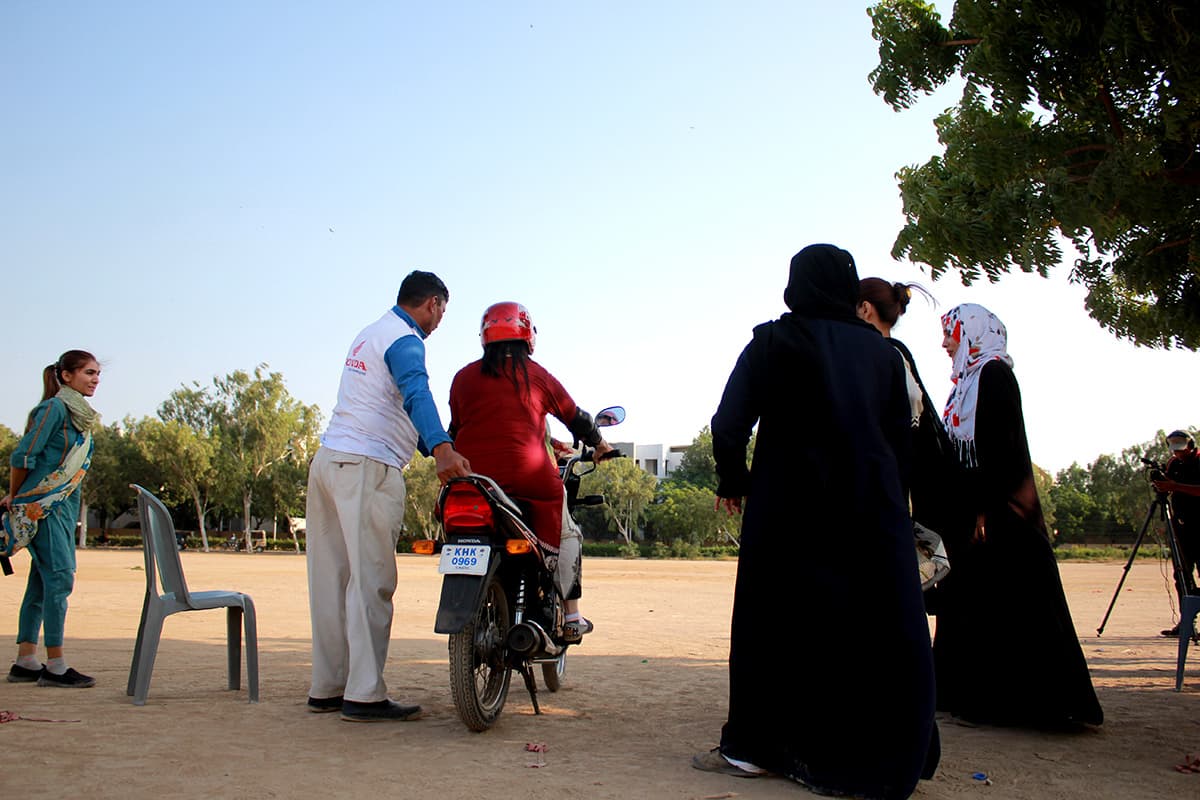Women On Wheels reveals why women want their own wheels
Seven women of all ages and from all socio-economic backgrounds are gathered around a man in his 50s, who instructs them about the dos and don’ts of riding a bike.
He stands up on the kick, places his knees around the fuel tank of the bike, and sits comfortably down, resting his back in a comfortable position: the angle that does not hurt your back is supposed to be a slant of almost 80 degrees.
Mr Fazl has been training people to ride a bike for five years now and I am amazed to see his spirit of teaching women with the same vigour that he would teach any other gender with.


To see women riding bikes in India is not surprising because Bollywood made us accustomed to it, but to have women on bikes go unnoticed in the bigger cities of Pakistan is still a wild concept. We, as women, turn back twice to confirm and reassure ourselves, but obviously, men stare back to catcall or judge the woman on wheels.
In a social fabric like ours, to see a project like a free bike training facility exclusively for women is heartening. However, it is still easier said than done when we align the realities of a Pakistani woman’s daily life.
Afshan, a housewife and mother of five, awaits her turn at the personal training because she was a bit late to the first session. She had to ask her husband to drop her at Karachi University, where the first batch of Karachi’s Women On Wheels participants is being trained.

“I have always had dreams higher than society could accommodate for me. I got married when I entered class nine, and so I never even got the chance to go through with my matriculation. But now that my eldest is in grade nine himself, I can trust him to take care of my youngest, who is two-and-a-half years old. Now is my time,” she shrugs.
Unlike Afshan, another participant, Faiza Frances, is a nurse at a reputed hospital in Karachi and has to face the brunt of an infrastructurally stunted city. “Half of my salary goes into my commute expense,” claims Faiza, who has set up a monthly rickshaw to travel to and from work because the uncertainty of public transport regularly makes her late to work.
Faiza and her sister have come along with their aunt, who is in her 40s and will also be learning how to ride a bike so that she doesn’t have to depend on anyone.

Though her husband dropped her off at the venue, Afshan cannot mention the three-hour training in front of her mother-in-law because riding a bike for a woman in her family is considered disgraceful. “I have figured that I will not tell them before learning, but once I know how and have a bike of my own, they will get to know automatically, because my husband is supportive,” says Afshan.
For Ramsha, who has also arrived to learn how to ride for the first time in her life, family support is on top of the list because she’s responsible for a single parent. “I’ve always had to be independent because I had no other option, and also because that’s just how my mother raised me to be.”
She teaches at a special needs school and is also enrolled as an undergraduate student in Karachi University. On a regular work day, she leaves home at 7am and returns by 9pm, out of which a total of three hours are spent waiting for and travelling on the public bus. No carpooling or ride-hailing apps function along her route and thus her only way to commute is via bus.

Living in Karachi and being out on the streets every day, harassment has taken a toll on Ramsha’s life. Her burqa has failed to protect her, she says, so now she’ll get her own bike so that she doesn’t have to wait for buses to arrive.
“The kinds of catcalling that we ignore every day is traumatising and I am preparing myself for it to get more intense once I get on the bike and take it across the city,” explains Ramsha. “I’ll just keep doing my thing and eventually our numbers will be too loud for it to be an anomaly for women to ride bikes in Pakistan,” she says as she ties her burqa into a knot in front of her so it won’t flow as she rides. It is still risky, but she does it anyway.
A couple, both in their 50s, have come here to fulfil the dream the wife had when she was in her 20s. “I tried to teach her when we were newly-married, almost 30 years ago, but she couldn’t learn because my bike was a kick-start and not very comfortable,” he smiles.

“But now I will definitely learn, I have also enrolled my university-going daughter here, so she will also learn with me tomorrow onwards,” added the wife.
Lots of women have already registered for the Karachi chapter of Women On Wheels and they will soon be reclaiming public spaces in Karachi.
WoW is a project by Salman Sufi Foundation, which brought it to Sindh after Punjab will be taking it across Pakistan next. They are still open for registrations — you can sign up here.





Comments